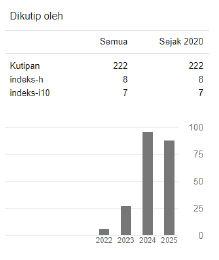Moral Development Strategy in Shaping Youth Character through Al-Qur'an
 https://doi.org/10.54012/ijcer.v1i1.78
https://doi.org/10.54012/ijcer.v1i1.78
 Abstract views: 470
Abstract views: 470
 PDF downloads: 857
PDF downloads: 857
Keywords:
Moral Formation, Strategies, Youth Generation, The Qur’an, Youth CharacterAbstract
Lately, the era of globalization has had a less positive impact on the current generation of teenagers, this can happen because of the ongoing degradation of moral decline in youth. This is due to the acquisition of less positive things from various factors. For example, the excessive use of technology so that technology spoils teenagers, the decline in the behaviour of teenagers in everyday life, both in the school environment, home, and society in general. To find out strategies in forming youth morale by collecting research results in journal articles. This is intended for the younger generation to improve themselves and prepare them to build the nation in the future. A systematic review was used in the ways in obtaining Islamic youth character. Various articles are accessed using the Google Scholar database, ScieneDirect, and many other article search engines. This research showed that the moral formation of adolescents is very important in shaping the personality of adolescents and is expected to be able to build a nation with moral values that the Qur'an guides. Not only that, teenagers are also equipped with moral values to carry out their future lives.
Downloads
References
S. Nasihatun, “Pendidikan Karakter dalam Perspektif Islam dan Strategi Implementasinya,” Andragogi J. Diklat Tek. Pendidik. dan Keagamaan, vol. 7, no. 2, pp. 321–336, 2019, doi: 10.36052/andragogi.v7i2.100.
A. Mukhid, “KONSEP PENDIDIKAN KARAKTER DALAM AL-QUR’AN,” Nuansa, vol. 13, no. December, pp. 309–328, 2016.
C. A. Myers and H. Cowie, “Cyberbullying across the lifespan of education: Issues and interventions from school to university,” Int. J. Environ. Res. Public Health, vol. 16, no. 7, 2019, doi: 10.3390/ijerph16071217.
C. Kivunja and A. B. Kuyini, “Understanding and Applying Research Paradigms in Educational Contexts,” Int. J. High. Educ., vol. 6, no. 5, p. 26, 2017, doi: 10.5430/ijhe.v6n5p26.
A. Mannan, “Pembinaan Moral dalam Membentuk Karakter Remaja [Moral Coaching in Shaping Youth Character],” J. Aqidah-Ta, vol. III, no. 1, pp. 59–72, 2017.
D. Lamondo, I. Husein, S. Suparmin, U. Wahidin, M. Elveny, and R. Syah, “An Interpretation of Algorithm Results for Narrative Blood Chemistry Laboratory : A Systematic Review,” Syst. Rev. Pharm., vol. 12, no. 1, pp. 217–224, 2021.
S. Apriyanto, Gender Strategies in Learning English, vol. 73, no. July. 2019.
S. Apriyanto, “Trump and the Language Use : An Analysis of President ’ s Quotes through CTA,” no. 22968, pp. 22968–22982, 2020.
A. A. Syukron, “Pendidikan Moral Kids Zaman Now Dalam Perspektif Islam,” J-PAI J. Pendidik. Agama Islam, vol. 4, no. 2, pp. 159–179, 2018, doi: 10.18860/jpai.v4i2.4620.
F. Y. Ainusyamsi and H. Husni, “Perspektif Al-Qur’an tentang Pembebasan Manusia melalui Pendidikan Akhlak,” J. Penelit. Pendidik. Islam, vol. 9, no. 1, p. 51, 2021, doi: 10.36667/jppi.v9i1.670.
D. M. Hakim, “Pendidikan Moral Dalam Perspektif Shaykh Nawawi Al-Bantany,” Andragogi J. Ilm. Pendidik. Agama Islam, vol. 1, no. 1, p. 15, 2019, doi: 10.33474/ja.v1i1.2782.
R. Hasanah, “PENDIDIKAN KARAKTER DALAM PRESPEKTIF AL-QURAN HADITS Rafiatul,” HOLISTIKA J. Ilm. PGSD, vol. Volume IV, no. 1, p. 3, 2020, [Online]. Available: jurnal.umj.ac.id/index.php/holistika.
D. Supardi, A. Ghofar, and M. Nuryadien, “Konsep Pendidikan Moral Imam Al-Ghazali dan Relevansinya dengan Pendidikan Agama Islam di Indonesia,” J. Al Tarbawi Al Haditsah, vol. 01, no. 02, p. 3, 2017, [Online]. Available: file:///C:/Users/Asus/Downloads/1235-3135-1-PB (1).pdf.
H. M. Khan, W. Khan, S. Farooq, A. Aleem, and M. Mann, “The Role of Islamic Education in Moral Character Building of Pakistani Youth : An Analytic Study,” vol. 7, no. 9, pp. 174–181, 2021, doi: 10.5281/zenodo.5500731.
A. Binti Mat Yusoff, M. H. B. A. Rahim, A. A. bin A. Hamid, and F. binti Ahmad, “Metacognitives And Morals: The Qur’an As A Guide,” Turkish J. Comput. Math. Educ., vol. 12, no. 4, pp. 659–664, 2021, doi: 10.17762/turcomat.v12i4.550.
Y. Li, “On the Rational Analysis of Quality Development for Teenagers’ Moral Education,” Proc. 2021 6th Int. Conf. Mod. Manag. Educ. Technol. 2021), vol. 582, no. Mmet, pp. 378–383, 2021, doi: 10.2991/assehr.k.211011.068.
N. Nuriman and F. Fauzan, “The Influence of Islamic Moral Values on the Students’ Behavior in Aceh,” Din. Ilmu, vol. 17, no. 2, pp. 275–290, 2017, doi: 10.21093/di.v17i2.835.
N. D. Tsoraya, O. Primalaini, and Masduki Asbari, “The Role of Islamic Religious Education on the Development Youths’ Attitudes,” J. Inf. Syst. Manag., vol. 01, no. 01, pp. 12–18, 2022, [Online]. Available: https://jisma.org/index.php/jisma/article/view/3.
Downloads
Published
How to Cite
Issue
Section
License
Copyright (c) 2022 Siti Marpuah

This work is licensed under a Creative Commons Attribution-ShareAlike 4.0 International License.









